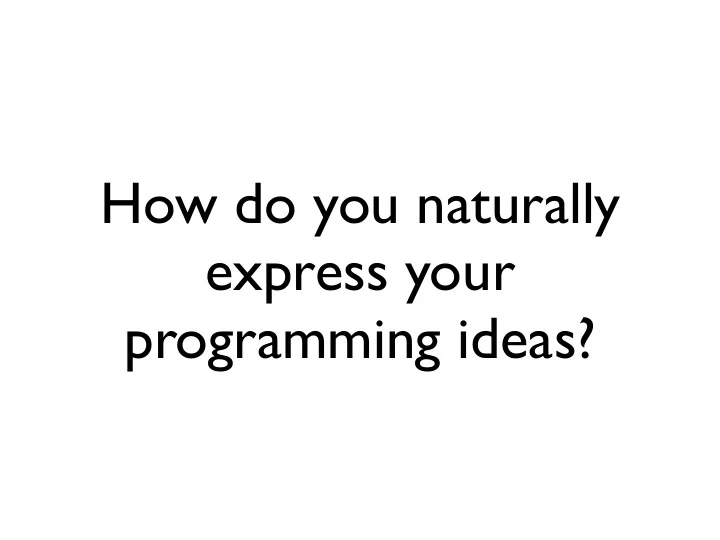

How do you naturally express your programming ideas?
Embracing Informality and Ambiguity Kenneth C. Arnold and Henry Lieberman Software Agents ‧ Commonsense Computing Initiative MIT Media Lab ‧ Mind Machine Project
the world is complex, so Say what you know, and not more. By forcing us to use precise vocabulary, software development makes us say too much.
Proposal In Brief • Development tools should let us talk about our programs in many ways. • Different degrees of formality • Different degrees of ambiguity • Interactively develop rich mappings: an ecosystem of different representations “You don't understand anything until you learn it more than one way.” Marvin Minsky
When we can be informal and ambiguous, software will: • Be easier to develop • Adapt to new situations • Behave reasonably when things go wrong
Clarifying Terms... • Specs and tests are formal but ambiguous. • Formal = controlled semantics; incl. programming languages. • Managed, intentional ambiguity
When we can be informal, Developing Software is Easier • Computer helps earlier in design • Formality forces premature commitment • Can communicate in more natural language (not just write code that looks like English) • Let computer help evaluate multiple ways of solving a problem
How? • Understand the informal representations • Map to increasingly formal specs, code, and tests • Learn by reading existing code (just like good programmers do today) • Semi-automatic, example-driven iterative refinement
����������������������������������� ������������������������������� �������������� ���������������� ������������������������� ��������������������������������������������������� ������������������������������� ������������������� ����� �������������������� ���������������� ����������������� ��������������� ������������������ �������� �������������� ���������������� ���������������� ������������������������ ���������� ����� ���������������������� �������������� ������� ������������������ �������� �������������� ����� ����������������� �������� ��������������� �������� ���������� ����������� ������������������ �������� ��������������� ������� ������������������������ ������������������������ Zones ��������������������� �������������������� ���������������������� ������������� ����������������� ��������������������������� �������������� ������������������� �������������
When we can be informal, Software will adapt to new situations • Software in the complex and rich real world • Real life is more nuanced than any programmer can plan (or just wait, it’ll change) • User considerations impact even backend • Software must act appropriately in a variety of situations
How? • Software that knows about everyday life • crowdsourcing (ConceptNet) • hand-coding (Cyc) • learn from sensors, social media, etc. • Context-appropriate behavior: continuously evaluate against informal representations
When we can be informal, Software will fail intelligently • If software always failed in expected ways, explicit failure handling would be merely tedious • Enumerating failure scenarios impossible in complex systems. • A system that only works one way can fail in many ways
Failing Intelligently • try alternative approaches • central problem-solving knowledgebase • informed defaults for unspecified details • suggest possible failure scenarios and reasonable courses of action
Discuss... • When we can be informal and ambiguous, software will ‣ Be easier to develop ‣ Adapt to new situations ‣ Behave reasonably when things go wrong • Development tools should permit artifacts at different degrees of formality and ambiguity, and interactively develop rich mappings among them
Recommend
More recommend